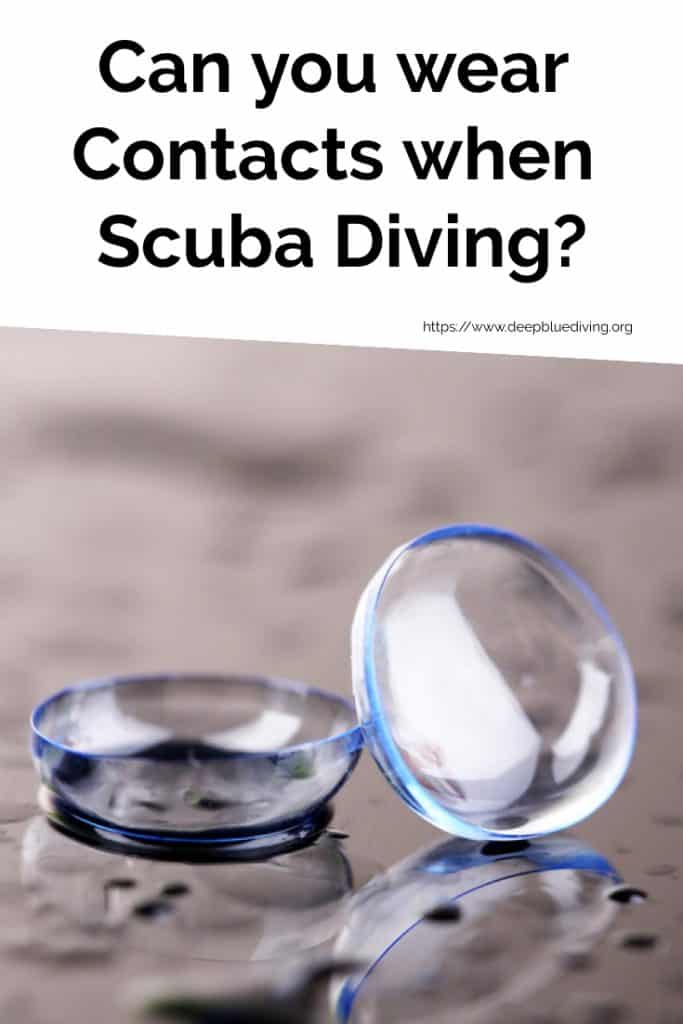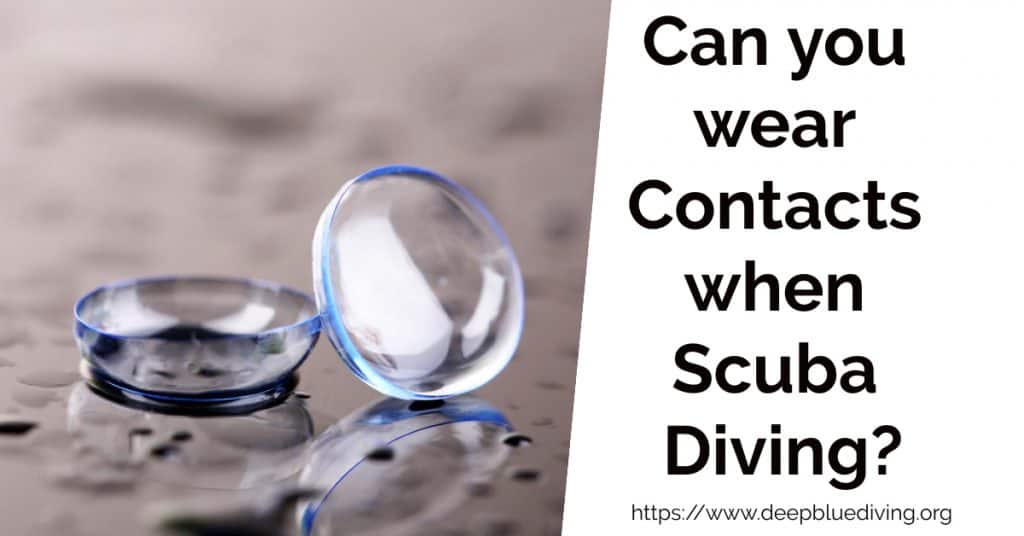Can You Wear Contact Lenses While Scuba Diving?
Of course you can wear contacts when you go scuba diving!
Imagine plunging into the depths of the ocean and not see all that beauty underneath with such colorful creatures swimming alongside you when you don’t have your contact lenses on? FOMO is real.
While water may have the effect of increasing the size of whatever surrounds you beneath, the visually impaired diver may still have trouble deciphering his pressure gauge readings or seeing the hand gestures of his dive companions if he didn’t have his prescription glasses or lenses on in the first place.
Thankfully, contact lens wearers can dive. They may not be the most comfortable thing in the world, but they will help your eyesight, especially in blurry waters that even those with perfect vision may have a slight difficulty with.
Although swimming with contact lenses are often discouraged because of possible contaminants from freshwater and tap water, contact lens wearers will still do just fine when they engage in their diving activities.
The difference is the presence of a dive mask for that added layer of protection on your lens which will prevent it from absorbing any harmful chemicals in water.
In any case, you will have to take note of several things so you can wear them safely underwater.
Hard or soft lens, and everything in between
There are things you should consider as far as your vision problem is concerned.
- seeing clearly underwater
- effect of water on your vision
- prescription mask alternative
Technically, you can use both hard and soft lenses, but the latter has more advantages over the hard types. Here’s why.
Hard contact lenses are built with pre molded plastic or polymethyl methacrylate. They are the OG lenses that are designed to just cover the iris. They may be cheap and durable, however they do not have the flexibility to conform to your eye shape. Add to that the discomfort you will experience wearing them because it limits the oxygen that reaches the cornea. Other setbacks include:
- eye irritation caused by settled dust
- cannot be worn overnight and when sleeping
- dries up your eyes
- can slip during a dive
When nitrogen can’t escape the eye during which the diver goes up above a lot faster, this will cause bubbles to settle between the lens and cornea. This typically results in an indentation on the lens that will bring about the hazy vision as a result. Whether used under or above water, hard lenses should probably be your last option as there’s just more disadvantages to wearing them.
Then there are rigid gas permeable lenses. Call them hard lenses 2.0 but perhaps slightly better in some ways. Aside from allowing gas to escape, they are bigger, a little more comfortable to wear with some of them being tolerated while sleeping although this is still being discouraged by optometrists. They tend to be suctioned however, with the increase in atmospheric pressure at sea.
Soft lenses are your best bet compared to the hard lens being flexible and having the ability to hold water that is almost twice the weight of the lens itself. They are not only the biggest in size for your eye, they can also be covered by your eyelid so they will not accidentally fall off as easily as a hard lens would.
It is permeable to gas, which means you will avoid unwanted build up in that space between your lens and eye.
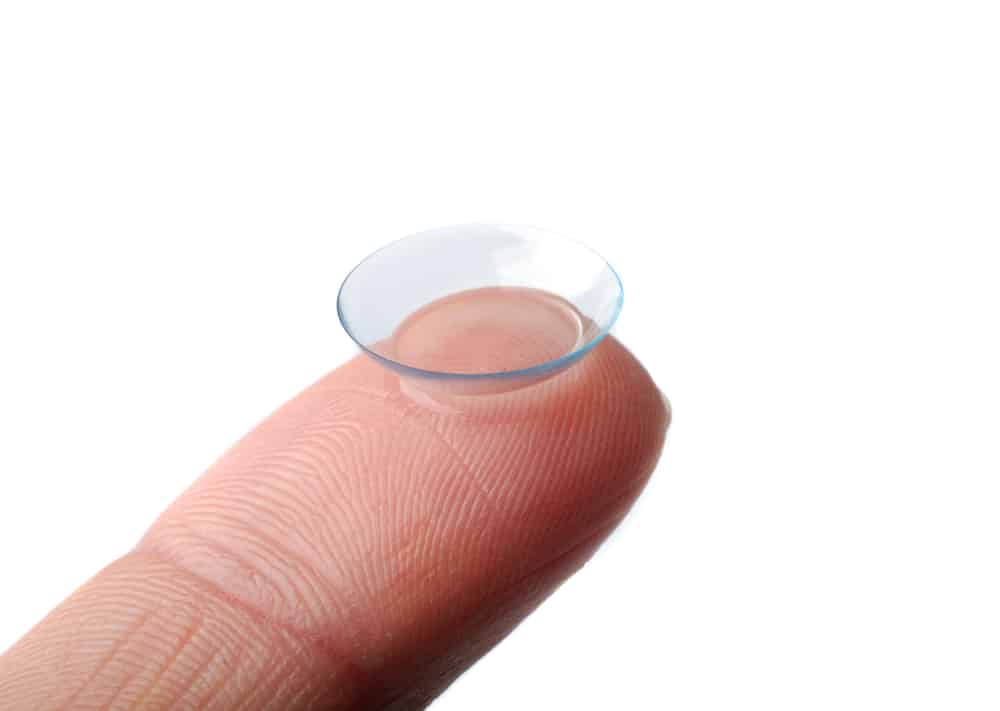
There are basically three types of soft contact lenses, namely, daily wear, extended wear and disposables. Daily wear lenses are as labeled – they can be worn during the day only.
Extended wear lenses on the other hand can be worn overnight up to a number of days. While you can clean them after a while, it is recommended to routinely remove them to avoid potential eye damage.
Meanwhile disposable lenses will seem safer than the other two types of soft lenses, You can wear them for a couple of weeks and discard them afterwards. This prevents your eye from developing infections such as keratitis that are caused by prolonged contact lens use. And more appropriately, you’ ld be better off not reusing contact lenses that have been exposed to untreated water such as saltwater which can house microbes and particles.
For those with astigmatism in terms of being nearsighted and farsighted, they can still make do with spherical correction while underwater.
Nonetheless, there are still several concerns about wearing soft contacts underwater. First is the hydrophilic nature of soft contact lenses which was earlier mentioned.
When you dive in saltwater, some of it will be absorbed by the lenses. As such, it will stick to the eyeball, which can cause an eye irritation given the saltiness of the water.
Another effect would be drier eyes, which can be resolved by lubricating eye drops to restore moisture. You should also be conscious of the cleaning agent you use for defogging your dive mask. This is because your contacts may absorb the components being worn atop which can contribute to eye irritation as well.
What about a prescription mask?
Safe as it may be, there is still one more option for the four-eyed diver. And that would be a prescription dive mask. It’s essentially replicating your eyeglasses in dive mask form, may it be bifocals, single vision or simply for reading.
You’ll use the same type of eyeglass lenses and placed onto the mask. This could be a pricier option being customized whether you just get the lens to be used on your own dive mask, or purchase it all together.
There is also a drop in type where you can use interchangeable lenses for your dive mask based on the reading of your diopter. Such diopter measurements are incremented by -.50 unlike for prescription lenses that are -.25.
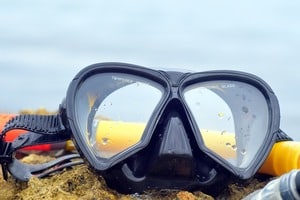
This would make a world of difference in case your actual prescription is -1.25 which will have to increase to -1.5 when using the interchangeable lens for your dive mask.
Another disadvantage of such lenses would be visual distortion on your peripheral line of sight which will not happen with a custom lens. You will also have to factor in the depth of which you will conduct your diving.
Loosely speaking, the deeper you, the foggier your lens can get.
Correction stickers can also be used which are small enough that can be stuck onto the default lens of your mask. They can come as stick-on bifocals in varying magnifications that won’t cost you a pretty penny.
In any case, you can opt for a more cost-effective scuba goggles with prescription at around 100 dollars. It would help if you try such masks to see if they fit right before proceeding with replacing it with prescription lenses. They are sleeker than your regular dive masks and a lot more unobtrusive as well. The surrounding rubber seal bars water from seeping in so you are able to protect your eyes.
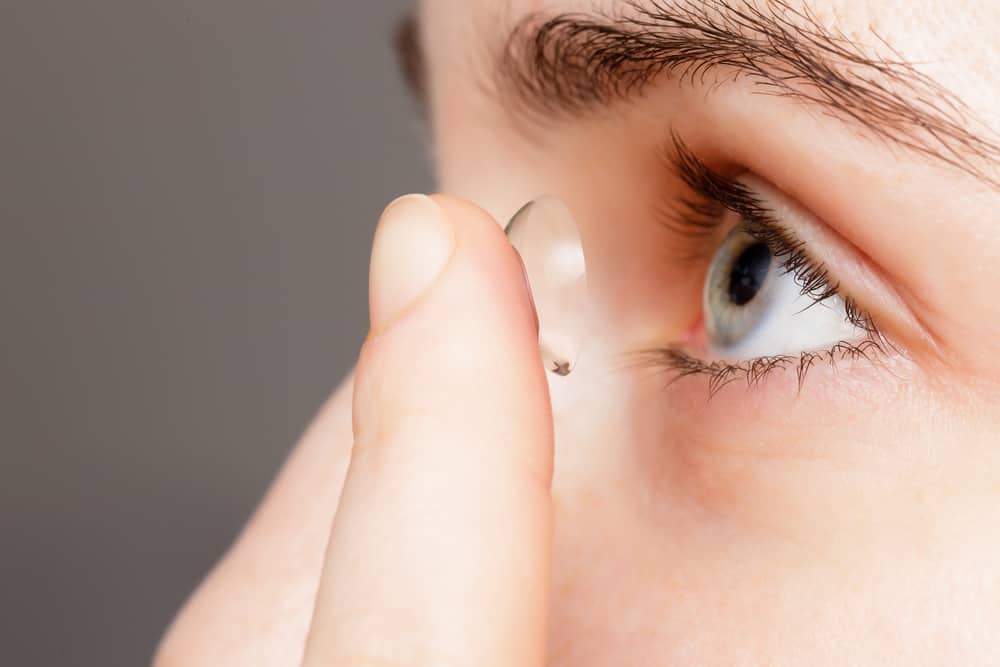
How to observe proper flooding of dive masks.
It was stated earlier how scuba dive masks provide a good amount of eye protection especially to contact lens users. In spite of this, your contact lens may still be vulnerable nonetheless. It is important that the dive mask you will put on is snug in order to prevent microorganisms from infiltrating your lenses.
At some point, your googles can accumulate water during prolonged dive trips. The first thing to do when that happens is to drain it right away. You can do this by pressing the top portion of the mask, followed by tilting your head backwards. Start breathing out bubbles from your nose. While you’re at it, you can also keep your eyes closed so you lessen the exposure of your contact lenses while there is still flooding in your mask. Not only are you able to flush out water, but you also get to keep your contacts on by not losing them in the process.
If you’re a diving newbie, it’s vital to inform your scuba diving instructor that you are wearing prescription lenses. This way, he can teach you techniques beforehand such as keeping your eyes shut while clearing your mask of trapped water.
Are Prescription Masks a Better Option than Contact Lenses?
The jury may still be out on this one, but ultimately it’s a matter of personal preference. If you wear contacts on the daily, then there’s no need for you to spend extra bucks for a custom lens. Moreover, a soft lens has less effect on diminishing your peripheral vision.
For divers who don’t feel comfortable wearing contacts, you can always turn to scuba masks that are fitted with prescription lenses, and bifocal stick-ons for those with monovision.
Having an imperfect vision is not uncommon hence most mask manufacturers have provisions for graded lenses so you won’t have issues with mask compatibility and the like. Having such an option can be a worthwhile investment as they can last a long time even if they are expensive.
To sum up, wearing contacts underwater to help with vision remains a safe practice for as long as its proper handling is employed.
